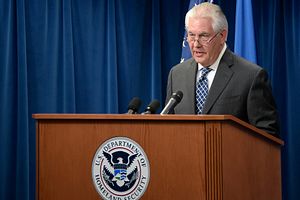A recent Vanity Fair report on the Rex Tillerson-led State Department made for harrowing reading. The workforce at State is shrinking, applications for new positions are shrinking, and morale is startlingly low. This article is hardly the only report to emerge regarding Tillerson’s mismanagement of the State Department. While some were initially hopeful that Tillerson would bring useful international business experience to DoS, it appears that Tillerson has approached State from a commercial perspective: trying to run the department in the same way he ran Exxon, despite substantial differences in culture and mission.
Conservatives have long been critical of State, viewing it as providing, in effect, a voice within the U.S. government for foreign and international interests. Conservatives have also viewed many of the specific goals of State (in terms of development, democratization, and women’s rights) with considerable suspicion.
But the Trump administration has gone well beyond the bounds of what previous Republican presidents have been willing to risk. Moreover, Rex Tillerson has emphatically rejected the idea that he should represent a bureaucratic advocate for State, a role that previous secretaries (such as Condoleezza Rice and Colin Powell) have embraced. Tillerson’s performance has received bipartisan pushback, especially from Tennessee Senator Bob Corker and Arizona Senator John McCain. However, given the degree of latitude that the President has over the management of foreign policy and the State Department specifically, there are hard limits on what Congress can force the administration to do.
The administration appears committed to the idea that it can manage foreign relations through arms-length, bilateral deals, and that the State Department simply contributes to unwanted engagement in the domestic and regional politics of other nations. This orientation would be more tenable if the Trump administration had demonstrated much of an inclination towards actively reducing the workload at State. To be fair, it has suspended some programs focusing on development and democratization. However, the administration’s preference for bilateral dealing does not, in any kind of substantial way, reduce the burden on State. The information demands associated with the conduct of effective bilateral diplomacy (language skills, regional expertise, domestic political expertise) are immense, and reports suggest that State is losing precisely the kinds of experts it needs to support Trump’s diplomatic vision.
Framed differently, the grand strategy (clumsily) advocated by the Trump administration does not necessarily imply a reduction in the need for diplomacy. Indeed, as the diplomatic footprints of China and India grow across the region, the United States will need a wide array of experienced diplomats to keep a handle on the complex politics of the Indo-Pacific. In order to score short-term political points, Trump and Tillerson may be shooting U.S. diplomacy in the foot over the long run.

































